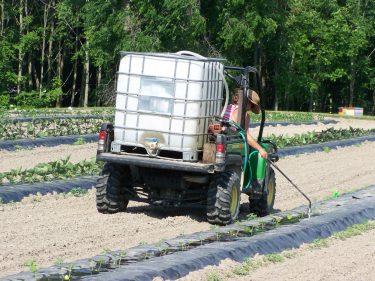Vermonters are taking a cautious approach to the use of Roundup after the Environmental Protection Agency recently announced that the prime chemical ingredient does not cause cancer.
Manufactured by Bayer-Monsanto, the popular herbicide is used by many Vermont farmers, municipalities and homeowners. The chemical is applied to maintain crop integrity and clear property of unwanted weeds such as wild parsnips.

Roundup herbicide on the farm: “EPA continues to find that there are no risks to public health when glyphosate is used in accordance with its current label and that glyphosate is not a carcinogen.” Pictured: Watering crops on a farm in New Haven, Vermont.
“EPA continues to find that there are no risks to public health when glyphosate is used in accordance with its current label and that glyphosate is not a carcinogen,” the agency said in a recent statement.
The U.S. Department of Agriculture approved of the EPA’s recent ruling.
“If we are going to feed 10 billion people by 2050, we are going to need all the tools at our disposal, which includes the use the glyphosate,” U.S. Secretary of Agriculture Sonny Perdue said. “USDA applauds EPA’s proposed registration decision as it is science-based and consistent with the findings of other regulatory authorities that glyphosate does not pose a carcinogenic hazard to humans.”
Roundup, whose principal ingredient is glyphosate, has been linked to non-Hodgkin’s lymphoma in a highly publicized case from outside the state. In a California trial held in March, jurors sided with the claimant despite the evidence presented by Bayer-Monsanto.
While the herbicide may conjure up Vietnam-era memories of Agent Orange defoliant use and health hazards posed to veterans, Roundup is chemically different.
Roundup’s glyphosate is an herbicide salt. It is applied to plants as a means of killing unwanted broadleaf plants and grasses.
“The sodium salt form of glyphosate is used to regulate plant growth and ripen specific crops,” according to the National Pesticide Information Center’s website. “Glyphosate was first registered for use in the U.S. in 1974.”
In Vermont, Roundup has been used in feed cornfields by traditional dairy farms but shunned by organic farmers.
“We know that tons of Roundup is used every year in Vermont on conventional farms, and the use of the chemical has increased in recent years,” said Kim Norman Mercer, communications director of the Northeast Organic Farming Association-Vermont (NOFA-VT).
While Mercer did not cite a specific Roundup warning issued by NOFA-VT, she noted that the Washington, D.C.-based environmental organizations Beyond Pesticides and Food and Water Watch reflect the Vermont organic farming group’s own opposition to not only Roundup, but virtually all farm chemicals. Both environmental groups support left-leaning political policies.
On its website, Beyond Pesticides states that it works to create “a world free of toxic pesticides.” Many pesticide alerts and related lawsuits against manufacturers are reported by the organization.
As noted on its website, Food and Water Watch is skeptical of the new EPA guidelines regarding Roundup.
“The agency has made one thing clear: it’s letting corporate pressure stop it from doing its job, which is protecting us and the environment,” Food and Water Watch’s Christian Detisch said. ” … So while it’s upsetting, it should come as little surprise that after the World Health Organization found last year that glyphosate, the main ingredient in the weed killer known as Roundup, is ‘probably carcinogenic to humans,’ the EPA shirked the science.”
Embracing or rejecting such EPA findings may have more to do with pre-conceived ideas and ideological concerns rather than any hard-scientific findings presented by a chemical manufacturer or a government regulatory agency.
Yet not all environmental groups in Vermont with typically left-leaning policies have taken a stand regarding the Roundup controversy. For example, the Vermont Natural Resources Council (VNRC) takes sides on other charged issues, but not so in the case of Roundup’s use.

State Sen. Christopher Bray, D-Addison: “I do remain concerned as does the Agency of Agriculture Food and Markets, that any chemicals that are used be used in such a manner as to avoid any adverse impact on human health, as determined by the best science available.”
Vermont state Sen. Chris Bray, chair of the Senate Natural Resources and Energy Committee, lives in New Haven, a dairy farming community in Addison County.
“I don’t believe we (here in Vermont) have a Roundup policy, but rather general policies aimed at regulating the use of the broad category of ‘economic poisons’ that includes herbicides, insecticides, rodenticides, etc.” the Democrat lawmaker told TNR.
Bray noted that he is not aware of any “horror stories” regarding cancer scares related to the use of the herbicide in the Green Mountain State.
“I do remain concerned (in spite of the recent EPA announcement), as does the Agency of Agriculture Food and Markets, that any chemicals that are used be used in such a manner as to avoid any adverse impact on human health, as determined by the best science available,” he added.
Cary Giguere, director of Public Health, Agricultural Resource Management at the Agency of Agriculture, Food and Markets, doesn’t believe the EPA announcement means an automatic “green light” for using Roundup without care.
“I would suggest that the EPA’s statement isn’t necessarily refuting the decision of the courts but maintaining that when the scientific data is reviewed glyphosate has not been linked to cancer,” Giguere told True North. “A jury hearing oral arguments made a different decision. So, the current opinion about glyphosate was not born out of the best available science but by a jury of our peers. Both are valid methods of reaching decisions but have different ramifications.”
Despite the EPA’s easing of fears, Vermont officials contacted by True North remain cautious before jumping on the agency’s “safe-to-use” bandwagon.
“Vermont does not have a specific policy for Round-up,” according to Giguere. “The Agency of Agriculture, as the state lead agency for the control of pesticides, regulates pesticide use and believes pesticides are not inherently safe but can be used safely.”
Giguere said that glyphosate is in the top 10 percent of herbicide active ingredients used in the state.
“Glyphosate is less toxic comparatively to the majority of other herbicide-active ingredients on the market and its use is encouraged in some of our permit programs,” he said. “Highway and utility rights of way permits specifically.”
Bayer-Monsanto stated that it was vindicated by the EPA regarding its own past and on-going testing of the herbicide.
“Bayer firmly believes that the science supports the safety of glyphosate-based herbicides, which are some of the most thoroughly studied products of their kind, and is pleased that the regulators tasked with assessing this extensive body of science continue to reach favorable conclusions,” Bayer-Monsanto said following the EPA’s statement in April.
Lou Varricchio is a freelance reporter for True North Reports. Send him news tips at lvinvt@gmx.com.



Funny thing, in the 80’s when in college we were trained in forestry that this was nasty stuff, you needed to be licensed to use the stuff, suddenly it was ok to use. There were good jobs working the power lines with herbicides out of school, I opted out at the time.
It’s amazing what people will say and do for money.
They’re lying, especially if the “epa” says so
Where’s that guy who said he’d drink a cup of roundup, just to prove it’s safe? I understand he chickened out.
Maybe it’s not dangerous if used properly, but as always, it’s not nice to fool Mother Nature, and how many things in the past have proved not so safe as advertised?
Like all these teflon products, which were supposed to be so inert, now contaminating wells as PFOA’s or whatever they are called?
How about hiring some illegals cheap to pull up weeds?